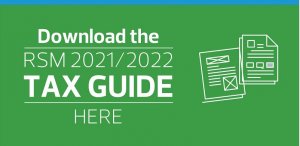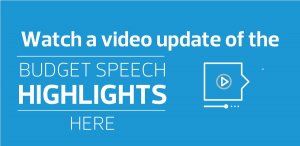Finance Minister, Mr Tito Mboweni, presented his latest budget speech on 24 February 2021. It was stated that last year Treasury had outlined a strategy to become a winning country, however this was prior to the widespread Covid-19 pandemic that has destroyed lives, jobs and damaged the economy.
As South Africa progresses with its vaccination campaign, it has brought about an allocation of more than R10 billion in the budget for the purchase and delivery of vaccines over the next two years. An interesting observation was that the Finance Minister drew no attention in his speech related to the allocation of funds to continue support for state owned entities.
From an economic outlook perspective, the South African economy is expected to rebound by 3.3% from a 7.2% contraction in 2020. In comparison, forecasted growth in China is set at 8.1%, in India the forecast is 11.5% and Sub-Saharan Africa is forecasting 3.2%.
Focusing on the tax aspects of the budget speech, Treasury is anticipating that tax collections in 2020/21 are expected to be approximately R213 billion less than the prior year forecast, the largest tax shortfall on record. In light of the dire situation of the South African economy, there was a genuine concern in the build up to the speech regarding new tax measures that may be implemented to address the shortfalls. Treasury has, however, acknowledged that Covid-19 has led to many business closures and job losses. In the interests of supporting households, businesses and the economy, government will not be introducing any measures to increase tax revenue. A summary of the more pertinent tax proposals include:
- Proposed reduction in the corporate income tax rate to 27%. This is however only planned for years of assessment commencing from 1 April 2022. This will be planned alongside a broadening of the corporate tax base by limiting interest deductions and assessed losses.
- The personal income tax brackets will be increased by 5% which is held to be higher than inflation. This should provide R2.2 billion in tax relief.
- The fuel levy will be increased by 27c per litre.
- There will be an 8% increase in the excise duties on alcohol and tobacco products.
- The UIF contribution ceiling will be increased to be in line with the benefit ceiling at R17 711.58 per month from 1 March 2021.
- The urban development zones and learnership tax incentives will be extended for two years while their reviews are completed.
- The sunset date for the venture capital company (VCC) incentive, which was initiated in 2009 to encourage retail investments in smaller businesses, will not be extended beyond 30 June 2021. The argument is that the incentive is not achieving the objectives of developing small businesses, generating economic activity and creating jobs. It is instead being used as a tool for the wealthy to provide a significant tax deduction.
- With the increased scenario of staff working from home during the Covid-19 pandemic, SARS will be reviewing submissions made in respect of travel and home office allowances.
- There is a planned review of the nature of long term service awards for fringe benefit purposes.
As part of the process of rebuilding SARS, an additional spending allocation of R3 billion will be provided to SARS to modernise its technology infrastructure and systems, expand and improve the use of data analytics and artificial intelligence capabilities, and participate meaningfully in global tax compliance initiatives. SARS will also expand its specialised audit and investigative skills in the tax and customs areas to focus on abuse of transfer pricing, tax base erosion and tax crime. SARS will also establish a dedicated unit aimed at improving compliance of individuals with wealth and complex financial arrangements.
Please note that the points addressed herein are limited to a summary of the more significant budget highlights and proposals from the 2020 National Budget Speech. There are a number of other aspects covered that we would be welcome to address if you so require. In addition, these matters addressed are not yet legislated, and may be subject to further changes so should not be used as a substitute for detailed professional advice.



